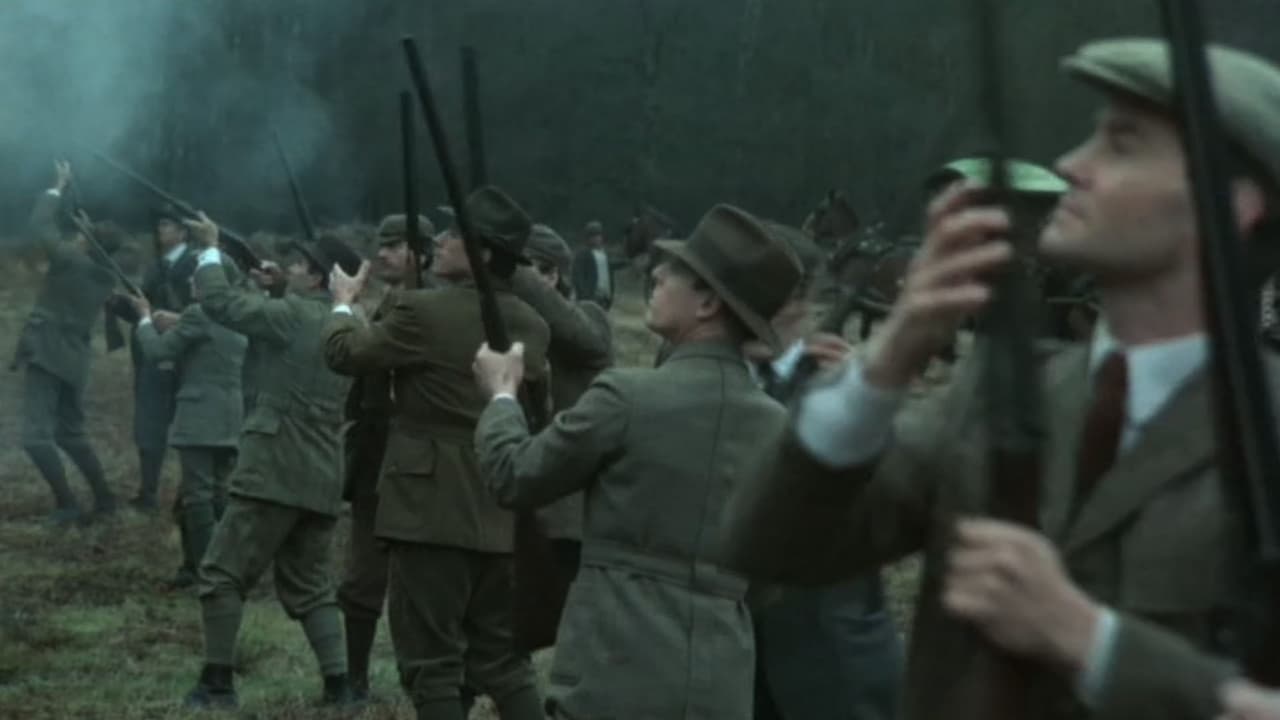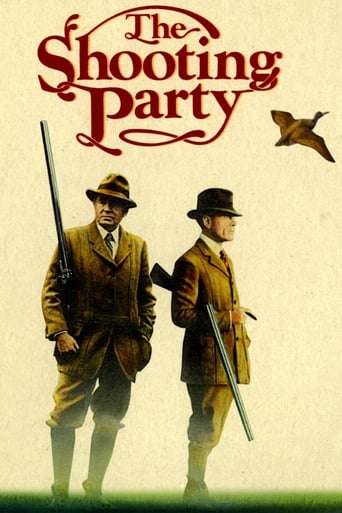

Truly Dreadful Film
... View MorePurely Joyful Movie!
... View MoreThis movie was so-so. It had it's moments, but wasn't the greatest.
... View MoreThere's a more than satisfactory amount of boom-boom in the movie's trim running time.
... View MoreNo spoilers, even if it had a plot, because I turned it off before the end.Two things in The Shooting Party work extremely well: and both are castings against type. John Gielgud, the ultimate actor-luvvie, as an early hunt saboteur, and Gordon Jackson as a lairy professional poacher, when he usually did cap-doffing yeoman or butlers. I will say he suffers a bit of accent drift. The casting of James Mason, in his last film, as an aristocrat of the old school doesn't work because James, god bless him, does a sort of bank CEO turn (see Anthony Hopkins in Meet Joe Black), which is not the same thing at all. But that doesn't matter because this is the National Trust version of Brideshead Revisited.For the rest of them, it's the usual suspects playing at toffs, and they have a lot of fun with old cars, guns and billiard tables. Edward Fox, who was to stuck-up black-tie wearing waxworks what Burt Kwouk was to Japanese POW camp commandants, does it on autopilot and it shows. A special mention however for two of the absolutely worst child actors I've seen in a long time. Producer's kids, probably. Sorry kids, I hope you found gainful employment in accountancy later on.It's good that they have plenty to do at this country house, because as far as the audience is concerned, there's NOTHING GOING ON. Some will say that the film lyrically shows the imminent collapse of the English aristocracy on the eve of World War I; I say this film will tell you more about the collapse of the English film industry under the weight of poorly scripted son-et-lumière nostalgia masquerading as historical drama - the sort of thing Stephen Poliakoff does on TV, or used to before budgets got really tight.This, of course, is the point of The Shooting Party - it was trying to show upstart TV that UK cinema could do costume drama so much better in the 1980's. Unfortunately it was wrong. The 1981 TV version of Brideshead Revisited will tell you all you need to know about the decline of the English ruling class, as well as being a rattling good yarn. The Shooting Party isn't so much a yarn as a bit of tinsel.
... View MoreAs a minimum, worth seeing for the superb moment when Nettleby (Mason) and Cardew (Gielgud) discuss the printing of pamphlets.Gielgud's role as the protester, and the various reactions to him, including from the customers in the local hostelry, are perfectly scripted and acted - and strangely moving. It is one of the film's multiple narrative threads.There are no points for seeing that the shooting party prefigures the global conflict to come. Nor is it really the case that the setting of the film is in some transitional world between a vanishing bucolic idyll and our modern age. The relationship between violence and civil behaviour that the film explores were as well known to the Victorians as to us. The Great War revealed nothing new about man's inhumanity. The only extra element, which the film darkly hints at, is the scale and consequences of the violence which modernity is capable of inflicting.
... View MoreOne of the extras with the DVD is a short film on the making of The Shooting Party which begins by reminding those intrepid buffs who keep abreast of such things and informing those who don't that Paul Schofield was originally signed to play the lead and would have done so were it not for an accident early in the filming. In other words James Mason may very well not have ended a distinguished career with a film as fine as this which would have been a great pity. Mason leads a fine cast in what amounts to an elegy for a lost age and if metaphors abound they do so stylishly and gracefully in muted tones as befits the time and the place, Autumn, 1913, indeed so subdued and low-key is the lighting that one could be forgiven for thinking that the lamps have already gone out all over Europe. Apparently Mason was given a private screening of the finished film at the Curzon and approved of it as well he might. Though not perhaps everyone's cup of tea this remains an exceptional piece of filmmaking.
... View MoreIf you remember Upstairs/Downstairs on PBS about the two different worlds in one house in London before the Titantic sailed and barbed wire and mass slaughter decorated the landscape of Europe,then this is a perfect accomplishment. Gordon Jackson who played the butler in the series is cast here as a poacher who gets hired to become a beater, someone who rouses the targeted wildlife in this case grouse I believe into the gunsights of the "swells". The English have a love- hate relationship with that time of determined inequality; James Mason in his last role, plays the lord of the manor,an intelligent patriarch of his ancestral holdings,several steps above the stereotype of a haughty inbred weasel satirized memorably by the Monty Python crew in their "Upperclass Twit of the Year" sketch. Mason is an aristocrat with a capital A who feels it is his DUTY to be the best not an entitlement. The others in this film range from starcrossed lovers he doomed to be a casualty of 20th Century warfare,the others representing snobs,fools, frivolous yet empty souled individuals who actually believed a little bloodletting would revitalize their spirits during the hunt and the subsequent war. While they may resent the foreigners for calling the ir English lackeys peasants it is how they treat them. Except for James Mason they are his yeomen the family's men at arms who probably followed his ancestors into battle when they raised a regiment of horse or foot for whatever struggle be it against the rival Europeans,killing rebel Scots or Irish ,or tangling with those American Cousins. Watch this film and see the difference between being a star and being an actor
... View More